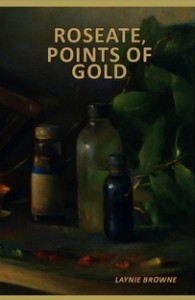Book Review
 Halfway through Roseate, Points of Gold, Laynie Browne appears to offer the key to decoding her often confounding ninth book of poems: “Attempts to record are ephemeral markings.” Browne’s prosody is appropriate to the textual layout of the collection: centered vignettes, whispers of ink against white space.
Halfway through Roseate, Points of Gold, Laynie Browne appears to offer the key to decoding her often confounding ninth book of poems: “Attempts to record are ephemeral markings.” Browne’s prosody is appropriate to the textual layout of the collection: centered vignettes, whispers of ink against white space.
Browne’s linguistic ancestry includes the physical motion poems of Gerard Manley Hopkins. Hopkins idiosyncratic, self-created mantra of “inscape”—the drive to transform experience through a poetics of mixture, juxtaposition, and phonetic play—created dense lyrics that required the patience of parsing. In “Harry Ploughman,” “Hard as hurdle arms, with a broth of goldish flue / Breathed round; the rack of ribs; the scooped flank,” moisture is drained from lines to create a peasant-icon: man as worker, God, and weapon. The challenges for the contemporary reader are many: Hopkins’s self-admitted oddness, his refashioning of British idiom, his grammatically confounding tendency to multiply adjectives. Hopkins reacted against the perceived Victorian poetic high-mindedness of the day with an equally distancing complication of language. Given enough care and time, a reader discovers beauty in the brawn of his compression, yet such poetic risks are not always so well received.
Browne’s content both intersects, and diverges from, Hopkins. She shares his interest in unpacking the natural world, choosing to focus on flora over humans, yet her decided break from Hopkins is the question of gender. While some have concluded that Hopkins eroticized the male form toward a particular androgyny, he certainly remained focused on the masculine rather than the feminine. Browne’s concern in this collection is the femininity of life itself, as distilled through an indeterminate “she” that populates the various sections of the book.
The appearance of the first-person in the initial poem of the collection becomes a mirage: these lines are given second-hand, which lends a detachment to the narrator’s observations. Still, “I’ve forgotten to mark these / passages” somehow feels immediate. The sequence “First Sea” documents dividing cells and further formations of body:
In the time before the heart divides into chambers
the body is shaped like the letter ‘c’
hands resemble the shells of a scallop
Browne imbues a second, more curious concurrent metamorphosis. Here, “body becomes sound.” In addition to a recursive strategy that links each poem by repeating particular phrases or words, Browne links sections of the book with the underlying metaphor of poet attempting to give letters to a fabulist world. Is this the articulation of a particularly feminine sensibility of genesis? Browne offers a compelling possibility:
In reference to the body, breath betokens ink, inscribing form
syllable of permission
When speech yields milk she breathes
neither up nor down
the image dissolves
In the same manner that Hopkins sought to transform, rather than record, meaning, Browne’s process appears to admit the fragmentary incapability of the poet to create a perfect myth. The narrator even wonders, “Which song shall I wish for this body, now a continuous child?” A symbol of feminine divinity enters the collection, who, at her “seaside altars,” looks northward and “asks that the door to the sky be open.”
At the book’s center, Browne pivots from lineated to prose forms. The choice is a practical success: a full book of the earlier sections’ intense compression might wrest communication from the narrative, but the prose forms allow full sentences and complete ideas. Browne opts for a slightly different lexicon here: gold, forms, and the paradox of static motion, as in “old windows swathed in wavy glass impart a subtle motion to the landscape.” Complications continue in “Gravity’s Mirror,” where enigmatic concepts are offered: “Now clearly she walks horizontally in both directions at once, recognizing the dimensionless quality of being (as the winter light), yet proceeding with an absolute form.”
If Browne’s individual offerings of language are clear, her narrative is sometimes blurry. Such a decision was likely deliberate, as with her imagistic spacing and placement throughout the book of text across the page. The reader’s desire for at least a clear antecedent is sometimes not possible. Certain sentences point toward the ineffability of meaning, the desire to play: “The mystery of experience is that blade which we point to—as a sealed door which represents something beyond the physical premises upon which one stands.”
So, what then is poetry, or the poetry of this book? The blade, us, the door, the representation? Poetry might simply be the mystery of the incomplete, and it need not be the answer to anything. Later, the line “She set out in search of a question” feels prescient. The narrative returns to an expectant mother, and yet it does so in wayward glances and continual diversions. Browne’s signs and referents in Roseate, Points of Gold are never fully explicated for the reader. A firm foothold is possible with her individual snapshots, but not the book as a whole. Such malleability is not a deficiency: it is often the first step toward the renewal of language.
About the Reviewer
Nick Ripatrazone is the author of two books of poetry, Oblations and This Is Not About Birds (Gold Wake Press, 2012), and a forthcoming book of criticism, The Fine Delight: Postconciliar Catholic Literature (Cascade Books, 2013). His writing has appeared in Esquire, the Kenyon Review, Shenandoah, Pleiades, the Iowa Review, and has received honors from ESPN: The Magazine.